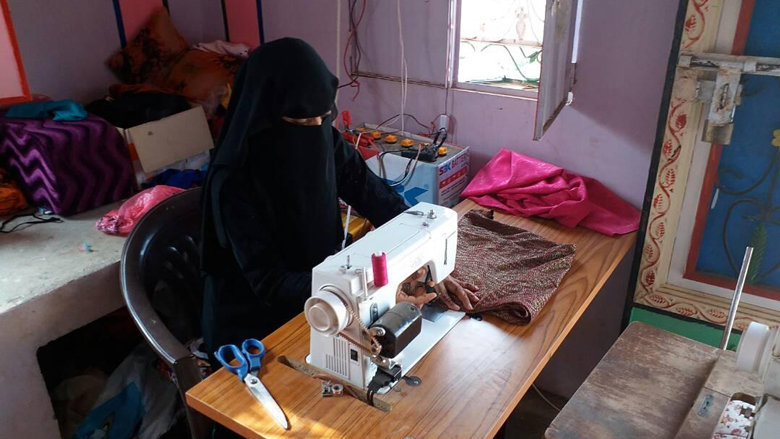An interview with Sami Sofan, Private Sector Development Analyst within the Finance, Competitiveness and Innovation Global Practice. His professional experience focused on SME finance, promoting entrepreneurship among youth, and expanding access of microfinance services to underserved populations.

Mariam sewing her way into her own financial independence.
1. Would you please tell us about the project and its objectives?
Micro and Small size enterprises are a significant source of jobs and economic activity in Yemen. SMEs have been severely impacted; the costs of doing business have increased, sales have dropped, jobs have been lost, and assets have been destroyed. Financial services to SMEs became even harder to find than prior to the conflict, with banks and micro finance institutions reluctant to provide credit to SMEs and increasing the collateral they require in situations where they do provide credit at all.
Seeing the challenges faced by SMEs, Yemen’s Social Fund for Development (SFD) decided to establish the Loan Guarantee Program (LGP). The World Bank provided technical assistance advisory, funded by the MENA Transition Fund of the Deauville Partnership, for the establishment of the LGP. The program was officially established on July 16, 2017.
2. What is the scope of this project and how will it help Yemenis during the on-going crisis?
The project is focused on providing guarantees to SME clients in Yemen. The guarantees are issued to SME as clients of microfinance Banks and institutions. It is envisioned that the Loan Guarantee Program will enable the banking sector to provide their financial services to a larger number of SMEs, resulting in continued resilience and growth of enterprises, creation of jobs, and support for the recovery of economic activity in the country.
3. What are the other challenges? How has the project tackled them?
Being the first of its kind in the country, the main challenge that we faced in the creation of the LGP was the lack of knowledge and awareness among Banks and microfinance institutions (MFIs) of the benefits the LGP can bring. The guarantee culture relied on traditional collateral-based guarantees and this resulted in very limited uptake from Banks and MFIs in the beginning. Banks and MFIs were hesitant to sign partnership agreements with the LGP as they did not understand the LGP’s function and services. The LGP worked heavily in addressing all the concerns that the Banks and financial institutions had, and they were eventually able to sign agreements with all the microfinance banks and institutions in the country.
4. What are the results of LGP and how has it impacted the lives of Yemenis?
To date, and since its establishment in the second half of 2017, the LGP has developed adequate organizational structure, operational and financial manuals, and placed qualified staff in order to begin providing its products and financial services to its SME clients. Between Nov 2017 and Feb 2018, the LGP has managed to sign partnership agreements with 6 microfinance institutions and Banks and issued over 56 guarantees to SMES.
5. What are the next steps?
The Bank will continue to provide the technical assistance needs by the LGP in order to maximize the reach and effectives of the program.